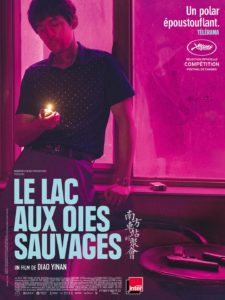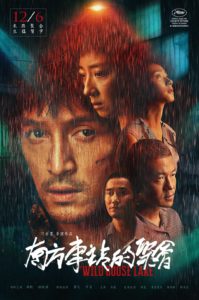The Wild Goose Lake
南方车站的聚会
China/France, 2019, colour, 1.85:1, 113 mins.
Director: Diao Yi’nan 刁亦男.
Rating: 3/10.
Artsy crime drama is devoid of original ideas and looks and feels like second-hand goods.
Wuhan city, Hubei province, central China, 19 Jul 2009. Outside a station in the south of the city, Liu Aiai (Gui Lunmei) meets Zhou Zenong (He Ge), who’s on the run from the police. She says she’s been sent by her boss, Huahua (Qi Dao), to tell him that his wife Yang Shijun (Wen Qi) will not be coming. (Two days earlier Zhou Zenong had attended a meeting of motorbike thieves in the basement of the Xingqingdu Hotel, called by Ma [Liu Chang] to divide up areas of the city between gangs. The meeting had broken up in violence after two brothers, Maoyan [Chang Jiahao] and Mao’er [Chang Jiazhuang], had wanted to take a street away from Zhou Zenong and one of Zhou Zenong’s men,  Huangmao Xiaojiang [Tang Qingsong], had fired a gun. Later, to resolve the situation, Ma had proposed a “stealing contest” between the two gangs to see how many bikes each could grab that night. During it, Huang Mao had been decapitated by a wire strung across a road; while inspecting his body, Zhou Zenong had shot at some people, not knowing they were police.) Zhou Zening and Liu Aiai move inside the station to continue talking; on TV is the news that he is being sought by police and has a RMB300,000 reward on his head. Zhou Zening had been wounded in the shootout with the police but had been treated at a hospital; the police, lead by Liu (Liao Fan), reckon he must be hiding out in the Wild Goose Pool lake area, which in summer is full of people and various activities, including “bathing girls” (prostitutes) run by gangsters like Huahua. Zhou Zenong tells Liu Aiai he’s not surprised Yang Shijun, whom he hasn”t contacted for five years, didn’t want to come to see him. Liu Aiai tells him that last night, in order to claim the reward, Huahua was persuaded into luring Zhou Zenong to Wild Goose Pool to meet Yang Shijun; Liu Aiai says she was given the job. Zhou Zenong wants only that his wife should get the reward when he’s arrested.
Huangmao Xiaojiang [Tang Qingsong], had fired a gun. Later, to resolve the situation, Ma had proposed a “stealing contest” between the two gangs to see how many bikes each could grab that night. During it, Huang Mao had been decapitated by a wire strung across a road; while inspecting his body, Zhou Zenong had shot at some people, not knowing they were police.) Zhou Zening and Liu Aiai move inside the station to continue talking; on TV is the news that he is being sought by police and has a RMB300,000 reward on his head. Zhou Zening had been wounded in the shootout with the police but had been treated at a hospital; the police, lead by Liu (Liao Fan), reckon he must be hiding out in the Wild Goose Pool lake area, which in summer is full of people and various activities, including “bathing girls” (prostitutes) run by gangsters like Huahua. Zhou Zenong tells Liu Aiai he’s not surprised Yang Shijun, whom he hasn”t contacted for five years, didn’t want to come to see him. Liu Aiai tells him that last night, in order to claim the reward, Huahua was persuaded into luring Zhou Zenong to Wild Goose Pool to meet Yang Shijun; Liu Aiai says she was given the job. Zhou Zenong wants only that his wife should get the reward when he’s arrested.
REVIEW
An artsy crime drama that has nothing to say beyond referencing other films, The Wild Goose Lake 南方车站的聚会 is 100% second-hand goods. There’s a world of difference between evoking others’ work to enhance a personal vision and simply copying others’ work for the sake of it, and it’s a shame that, after his interesting if imperfect whodunit Black Coal, Thin Ice 白日焰火 (2014), Mainland film-maker Diao Yi’nan 刁亦男 has reverted to the empty auteurism of his second feature, Night Train 夜车 (2007), rather than develop the more progressive, genre-spin elements of Black Coal. A onetime scriptwriter (Spicy Love Soup 爱情麻辣烫, 1997; Shower 洗澡, 1999) who’s directed a mere four features in 16 years, Diao, 51, seems to have already run out of ideas, with a paper-thin plot about a petty gangster on the run and a cast who mostly walk around reciting their lines like robots.
The setting is the diametrical opposite of Black Coal‘s, with the fierce heat of summertime central China replacing the bone-freezing cold of the wintry northeast. But where Black Coal had a very physical, visceral feel (partly thanks to regular d.p. Dong Jinsong 董劲松) that communicated itself to the viewer and defined the characters’ behaviour, Goose doesn’t even convincingly portray the debilitating heat of Wuhan city (one of the country’s traditional “three furnaces”) let alone make it an integral part of the movie. Instead, for Diao the setting is just about night, neon, rain and the rest – basic noir building-blocks that can be dramatically powerful or seductive in the hands of directors like Lou Ye 娄烨 or Wang Jiawei 王家卫 [Wong Kar-wai] but here seem like empty affectations, devoid of any relevance to the characters.
The plot, such as it is, spins on the leader of a gang of motorbike thieves accidentally shooting a policeman, going into hiding, and becoming the object of a massive manhunt, with a RMB300,000 price on his head. Everyone wants a slice of the money, including his underworld pals and enemies, though he himself wants it to go to his estranged wife, as a kind of mea culpa for his past treatment of her. A “bathing girl” (prostitute) who plies her trade in the Wild Goose lake area is used to lure him out of hiding, but she turns out to have shifting loyalties.
As the thief and the hooker, Shanghai TV actor Hu Ge 胡歌 and Taiwan actress Gui Lunmei 桂纶镁 (the female lead in Black Coal) are simply expressionless automata with no on-screen chemistry, with the latter especially wasted as a kind of blank-faced mannequin. Fractionally more expressive but equally unsympathetic are a goatee-less Liao Fan 廖凡 (Black Coal) as the surprisingly inept police detective and much-underrated actress Wan Qian 万茜 (Guilty of Mind 心理罪, 2017; God of War 荡寇风云, 2017) as the thief’s wife who appears to live in a wardrobe. (Diao’s film frequently veers towards parody in its pretentious flourishes.) All actors are further constricted by having to perform in Wuhanese, a dialect that’s native to none of them and means that even Chinese viewers mostly have to read the subtitles to work out what’s going on. (Dialect is frequently used in Mainland cinema nowadays, but generally to add local colour, not simply as an affectation.)
Working out what is going on is not always easy, given Diao’s flashback structure, lack of explanatory dialogue, and greater interest in staging meaningless setpieces (a chase in a zoo, a chase on motorbikes, a chase in a funfair) than in encouraging his audience’s emotional involvement with the characters. The film’s second half is an especially strung-out hawl, and way more pretentious than even the first. On a technical level, the action is amateurishly staged and editing often over-obvious – a surprise from experienced arthouse cutters Kong Jinlei 孔劲蕾 and Matthieu Laclau. Dong’s photography is not a patch on his work for Black Coal or for the period drama 11 Flowers 我11 (2011).
The film’s Chinese title literally means “The Get-Together at South Station”, the place where the two leads first meet. No doubt helped by the cachet of being in the 2019 Cannes festival’s competition, the film has earned a very respectable RMB203 million in the Mainland, double that of the much more commercial Black Coal (RMB104 million) and a sizeable amount for such artsy fare. However, a big chunk was made in its first week, mirroring the similar experience of another artsy Cannes entry, Long Day’s Journey into Night 地球最后的夜晚 (2018), most of whose RMB282 million was made in previews and first-week pre-bookings before word got out.
CREDITS
Presented by He Li Chen Guang International Culture Media (CN), Green Ray Films (Shanghai) (CN), Memento Films (FR), Arte France Cinema (FR).
Script: Diao Yi’nan. Photography: Dong Jinsong. Editing: Kong Jinlei, Matthieu Laclau. Music: B6. Art direction: Liu Qiang. Styling: Liu Qiang, Li Hua. Sound: Zhang Yang. Visual effects: Chen Donglin. Executive direction: Zhong Bei’er, Yang Xiao.
Cast: Hu Ge (Zhou Zenong), Gui Lunmei (Liu Aiai), Liao Fan (Liu, police captain), Wan Qian (Yang Shujun), Qi Dao (Huahua), Huang Jue (Yan), Zeng Meihuizi (Pingping), Zhang Yicong (Xiaodongbei), Chen Yongzhong (upstart), Li Zhipeng (Chang Chao), Liu Chang (Ma), Chang Jiahao (Maoyan), Chang Jiazhuang (Mao’er), Chen Zijie (Yang Zhilie), Qiu Wenyang (Xingqingdu Hotel manager), Tang Qingsong (Huangmao Xiaojiang), Fu Xiaoxian (Honghong).
Premiere: Cannes Film Festival (Competition), 18 May 2019.
Release: China, 6 Dec 2019; France, 25 Dec 2019.
